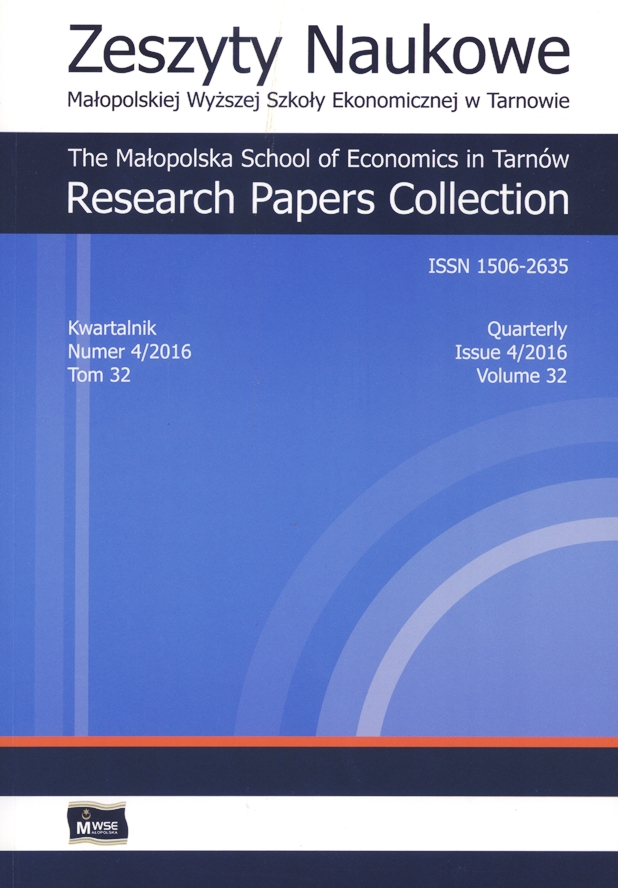Abstract
In many enterprises managing absenteeism is dictated by legal regulations in this regard and managerial pragmatics boiling down mainly to the control of absences and disciplining employees. In recent years, the approach of firms to employees has been changing. Caring about their condition, commitment and satisfaction from work are not perceived as a duty any more, but as a chance. However, there is no universal methodology of absenteeism management integrating the holistic approach and interdisciplinary approach, combining various spheres and perspectives. The aim of the paper is to present a concept of the absenteeism management system in an enterprise, aimed at the reduction of sickness absenteeism and the improvement of the enterprise performance. A thesis was adopted that the policy and operational activities undertaken within absenteeism management lead to the creation of common value for the firm and the employees. The presented concept of the system of managing sickness absenteeism includes five elements: goals and subject of the management, diagnosing causes and effects of absenteeism, preventive measures, the measurement of the effectiveness of the measures, as well as the analysis and assessment of the impact of these activities on the company’s performance, and the verification of the methods of absenteeism management process. To fulfil the goal defined in this way, the following research methods were used: an analysis of the research findings of predecessors and the findings of own empirical research into the conditions of the humanization of work and the factors of work motivation.
References
Bartkowski, J. (2004). Analiza absencji chorobowej w pracy na podstawie danych GUS i ZUS. In: E. Giermanowska, M. Racław-Markowska (ed.). Absencja chorobowa w Polsce. Warszawa: Instytut Spraw Publicznych. ISBN 8388594893.
View in Google Scholar
Beesley, C. (2013). 7 Tips for Controlling and Preventing Employee Absenteeism [online, accessed: 2013-04-11]. Retrieved from: http://www.sba.gov/community/blogs/community-blogs/small-business-matters/7-tips-controlling-and-preventing-employee-ab.
View in Google Scholar
Bisbe, J., Malagueño, R. (2009). The choice of interactive control systems under different innovation management mode. European Accounting Review, 18 (2), 371–405.
View in Google Scholar
Cascio, W., Boudreau, J. (2011). Inwestowanie w ludzi. Wpływ inicjatyw z zakresu ZZL na wyniki finansowe przedsiębiorstwa. Kraków: Wolters Kluwer Business. ISBN 9788326411793.
View in Google Scholar
Chappell, T. (1993). The soul of a business. Managing for profit and the common good. New York: Bantam. ISBN 0553094238.
View in Google Scholar
Chenhall, R. (2008). Accounting for the horizontal organization. A review essay. Accounting, Organizations and Society, 33 (4–5), 517–550.
View in Google Scholar
Chenhall, R., Langfield-Smith, K. (1998). Adoption and benefits of management accounting practices. An Australian study. Management Accounting Research, 9 (1), 1–19.
View in Google Scholar
Drucker, P. F. (1984). Converting social problems into business opportunities: The new meaning of Corporate Social Responsibility. California Management Review, 26 (2), 53–63.
View in Google Scholar
EU-OSHA. (2010). European Survey of Enterprises on New and Emerging Risks (ESENER)—Managing safety and health at work [online, accessed: 2012-02-22]. Luxembourg: Office for Official Publications of the European Communities. Retrieved from: http://osha.europa.eu/en/publications/reports/esener1_osh_management.
View in Google Scholar
Grant, A. M., Christianson, M. K., Price, R. H. (2007). Happiness, health, or relationships? Managerial practices and employee well-being tradeoffs. Academy of Management Perspectives, 21 (3), 51–63.
View in Google Scholar
Lopez-Valeiras, E., Gomez-Conde, J., Naranjo-Gil, D. (2015). Sustainable innovation. Management accounting and control systems, and international performance [online, accessed: 2015-03-23]. Sustainability, 7, 3479–3492. DOI 10.3390/su7033479. Retrieved from: www.mdpi.com/journal/sustainability.
View in Google Scholar
Maletič, M., Maletič, D., Dahlgaard, J. J., Dahlgaard-Park, S. M., Gomišček, B. (2014). Sustainability exploration and sustainability exploitation. From a literature review towards a conceptual framework. Journal of Cleaner Production, 79, 182–194.
View in Google Scholar
MERCER. (2016). Pan-European employer health benefits issues [online, accessed: 2016-10-05]. Human Resource Consulting Survey Report. Retrieved from: http://www.mercer.com/survey/pan-european-health-benefits-survey-results-2016.
View in Google Scholar
Pęciłło-Pacek, M. (ed.). (2013). Opracowanie kalkulatora wytycznych do oszacowania kosztów i korzyści działań skierowanych na ograniczenie absencji chorobowej związanej z pracą oraz materiałów szkoleniowych. Warszawa: CIOP–PIB.
View in Google Scholar
Porter, M. E., Kramer, M. R. (2011). Creating shared value. How to reinvent capitalism—and unleash a wave of innovation and growth. Harvard Business Review, 89 (1–2), 48–59.
View in Google Scholar
Smoliński, M., Słowik, J. (2016). Zdrowe przyśpieszenie. Harvard Business Review Polska. Special Issue.
View in Google Scholar
Striker, M. (2013). Absencja pracownicza a diagnoza dysfunkcji zarządzania zasobami ludzkimi. Acta Universitatis Lodziensis. Folia Oeconomica, 288, 143–151.
View in Google Scholar
Striker, M. (2015). Stereotypy dotyczące absencji chorobowej pracowników a zatrudnialność. Edukacja Ekonomistów i Menedżerów, 35 (1), 109–123.
View in Google Scholar
Thomas, M., Miles, G., Fisk P. (2009). Kompetentny CEO: Metody efektywnego działania dla menedżerów najwyższego szczebla. Transl. by M. Nalazek. Kraków: Wolters Kluwer Business. ISBN 9788376015620.
View in Google Scholar
Warr, P., Clapperton, G. (2010). The Joy of Work? Jobs, Happiness and You. London: Routledge. ISBN 9780415459662.
View in Google Scholar
Werner G. W. (2000). Praktyczny poradnik konserwacji maszyn i urządzeń. Team translation. Warszawa: Alfa Weka—Wydawnictwo Informacji Zawodowej. ISBN 8387287253.
View in Google Scholar
© Copyright by Małopolska School of Economics in Tarnów. The articles are available under the Creative Commons Attribution NonCommercial-NoDerivatives 4.0 International License


